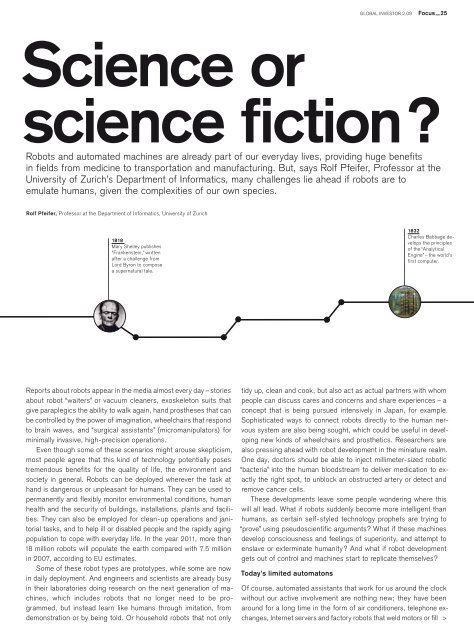Global Megatrends
Prepare yourself for the future Global Investor, 02/2009 Credit Suisse
Prepare yourself for the future
Global Investor, 02/2009
Credit Suisse
You also want an ePaper? Increase the reach of your titles
YUMPU automatically turns print PDFs into web optimized ePapers that Google loves.
GLOBAL INVESTOR 2.09 Focus — 25<br />
Science or<br />
science fiction?<br />
Robots and automated machines are already part of our everyday lives, providing huge benefits<br />
in fields from medicine to transportation and manufacturing. But, says Rolf Pfeifer, Professor at the<br />
University of Zurich’s Department of Informatics, many challenges lie ahead if robots are to<br />
emulate humans, given the complexities of our own species.<br />
Rolf Pfeifer, Professor at the Department of Informatics, University of Zurich<br />
1818<br />
Mary Shelley publishes<br />
“Frankenstein,” written<br />
after a challenge from<br />
Lord Byron to compose<br />
a supernatural tale.<br />
1832<br />
Charles Babbage develops<br />
the principles<br />
of the “Analytical<br />
Engin e” – the world’s<br />
first computer.<br />
Reports about robots appear in the media almost every day – stories<br />
about robot “waiters” or vacuum cleaners, exoskeleton suits that<br />
give paraplegics the ability to walk again, hand prostheses that can<br />
be controlled by the power of imagination, wheelchairs that respond<br />
to brain waves, and “surgical assistants” (micromanipulators) for<br />
minimally invasive, high-precision operations.<br />
Even though some of these scenarios might arouse skepticism,<br />
most people agree that this kind of technology potentially poses<br />
tremendous benefits for the quality of life, the environment and<br />
society in general. Robots can be deployed wherever the task at<br />
hand is dangerous or unpleasant for humans. They can be used to<br />
permanently and flexibly monitor environmental conditions, human<br />
health and the security of buildings, installations, plants and facilities.<br />
They can also be employed for clean-up operations and janitorial<br />
tasks, and to help ill or disabled people and the rapidly aging<br />
population to cope with everyday life. In the year 2011, more than<br />
18 million robots will populate the earth compared with 7.5 million<br />
in 2007, according to EU estimates.<br />
Some of these robot types are prototypes, while some are now<br />
in daily deployment. And engineers and scientists are already busy<br />
in their laboratories doing research on the next generation of machines,<br />
which includes robots that no longer need to be programmed,<br />
but instead learn like humans through imitation, from<br />
demonstration or by being told. Or household robots that not only<br />
tidy up, clean and cook, but also act as actual partners with whom<br />
people can discuss cares and concerns and share experiences – a<br />
concept that is being pursued intensively in Japan, for example.<br />
Sophisticated ways to connect robots directly to the human nervous<br />
system are also being sought, which could be useful in developing<br />
new kinds of wheelchairs and prosthetics. Researchers are<br />
also pressing ahead with robot development in the miniature realm.<br />
One day, doctors should be able to inject millimeter-sized robotic<br />
“bacteria” into the human bloodstream to deliver medication to exactly<br />
the right spot, to unblock an obstructed artery or detect and<br />
remove cancer cells.<br />
These developments leave some people wondering where this<br />
will all lead. What if robots suddenly become more intelligent than<br />
humans, as certain self-styled technology prophets are trying to<br />
“prove” using pseudoscientific arguments? What if these machines<br />
develop consciousness and feelings of superiority, and attempt to<br />
enslave or exterminate humanity? And what if robot development<br />
gets out of control and machines start to replicate themselves?<br />
Today’s limited automatons<br />
Of course, automated assistants that work for us around the clock<br />
without our active involvement are nothing new; they have been<br />
around for a long time in the form of air conditioners, telephone exchanges,<br />
Internet servers and factory robots that weld motors or fill >

















